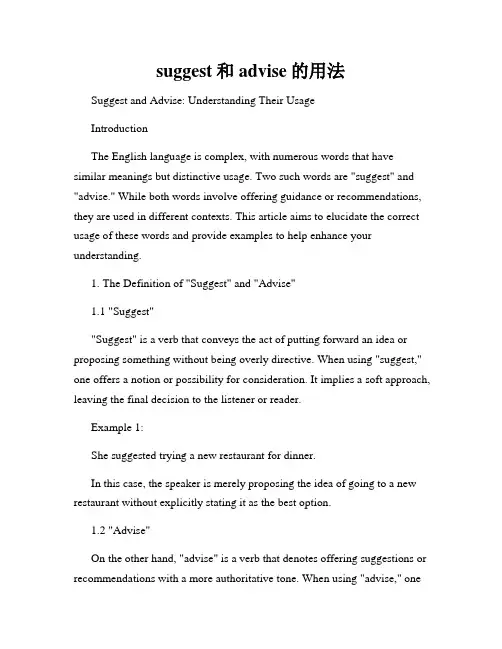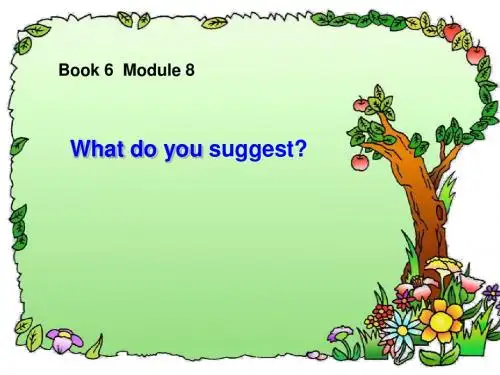Suggest的用法PPT课件
- 格式:ppt
- 大小:60.00 KB
- 文档页数:8




suggest和advise的用法Suggest and Advise: Understanding Their UsageIntroductionThe English language is complex, with numerous words that have similar meanings but distinctive usage. Two such words are "suggest" and "advise." While both words involve offering guidance or recommendations, they are used in different contexts. This article aims to elucidate the correct usage of these words and provide examples to help enhance your understanding.1. The Definition of "Suggest" and "Advise"1.1 "Suggest""Suggest" is a verb that conveys the act of putting forward an idea or proposing something without being overly directive. When using "suggest," one offers a notion or possibility for consideration. It implies a soft approach, leaving the final decision to the listener or reader.Example 1:She suggested trying a new restaurant for dinner.In this case, the speaker is merely proposing the idea of going to a new restaurant without explicitly stating it as the best option.1.2 "Advise"On the other hand, "advise" is a verb that denotes offering suggestions or recommendations with a more authoritative tone. When using "advise," oneprovides explicit guidance or instructions, indicating a preference for a particular course of action.Example 2:The doctor advised her to rest for a few more days.In this example, the doctor is making a strong recommendation for the patient to rest, implying that it is the best approach for recovery.2. Usage of "Suggest" and "Advise"2.1 "Suggest""Suggest" is often used in situations where one wants to propose an idea, offer possibilities or alternatives, or indirectly make recommendations.Example 3:He suggested studying abroad to broaden his knowledge and experience.In this case, the speaker is presenting studying abroad as an option to consider, without pressuring the listener into making a specific choice.2.2 "Advise""Advise" is employed when there is an explicit recommendation or instruction to be given, usually in professional or formal settings.Example 4:The financial advisor advised his clients to invest in diversified portfolios.Here, the financial advisor is providing explicit guidance, suggesting that investing in diversified portfolios is the best approach for their clients.3. Expressing Opinions with "Suggest" and "Advise"3.1 "Suggest"When expressing opinions, "suggest" is used to present an idea or viewpoint without enforcing it upon others. It offers a more gentle and open approach, allowing for different perspectives.Example 5:She suggested that they watch a movie instead of going out.The speaker is proposing watching a movie as an alternative, but is open to other suggestions or preferences.3.2 "Advise"In contrast, "advise" is employed when one intends to express a stronger opinion or recommendation, usually expecting others to follow the suggested course of action.Example 6:The teacher advised the students to review the textbook thoroughly before the exam.The teacher is strongly emphasizing the importance of reviewing the textbook, expecting the students to adhere to the advice for better exam preparation.4. Differences in Indirect Speech4.1 "Suggest"When reporting someone else's words, "suggest" is commonly used in indirect speech. This allows the speaker to present the original idea without directly quoting or imposing their own views.Example 7:He suggested that they take a break from work to reduce stress.Here, the reported speech allows the speaker to convey the idea without sounding pushy or demanding.4.2 "Advise"In contrast, "advise" is used when reporting someone's recommendations or instructions, without altering the meaning or altering the tone.Example 8:The lawyer advised her client to plead not guilty.By using "advise," the reported speech accurately represents the lawyer's instruction without any alteration.ConclusionIn conclusion, understanding the nuances between "suggest" and "advise" is crucial for effective communication. "Suggest" is a gentler way of making recommendations, presenting ideas for consideration. On the other hand, "advise" carries a stronger weight, offering explicit guidance or instructions. By recognizing their distinct usage, one can communicate more precisely and effectively in various contexts.。

suggest用法归纳总结-回复Suggest用法归纳总结引言:在日常英语交流中,我们经常需要向他人提出建议或者表达自己的观点和意见。
而“suggest”这个词在这样的情境中起到了非常重要的作用。
本文将对“suggest”的用法进行归纳总结,以帮助读者更好地掌握这个词的用法。
一、常用意思和用法:1. 表示提议或建议当我们想要提出一些建议或者给出一些建议时,可以使用“suggest”的动词形式,后面接的是一个名词或者动词的动名词形式,例如:- I suggest studying for the exam together.(我建议一起复习考试。
)- She suggested going to the park for a picnic.(她建议去公园野餐。
)2. 表示暗示或指出除了表示提议和建议外,“suggest”还可以用来表示暗示或者指出某种可能性或真实情况。
在这种情况下,我们可以使用“suggest”后面接名词、动词不定式或从句等形式,例如:- The dark clouds suggest that it's going to rain.(乌云暗示着要下雨。
)- His tone of voice suggested that he was unhappy.(他的语气暗示他不开心。
)- The data suggests that there is a correlation between these two variables.(数据表明这两个变量之间存在相关性。
)二、用法细节解析:1. Suggest + 名词当我们提出建议或者推荐某种方案时,通常使用“suggest”后接一个名词:- I suggest a different approach to this problem.(我建议对这个问题采取另一种方法。
)- She suggested a restaurant for our dinner.(她给我们推荐了一家餐厅。





